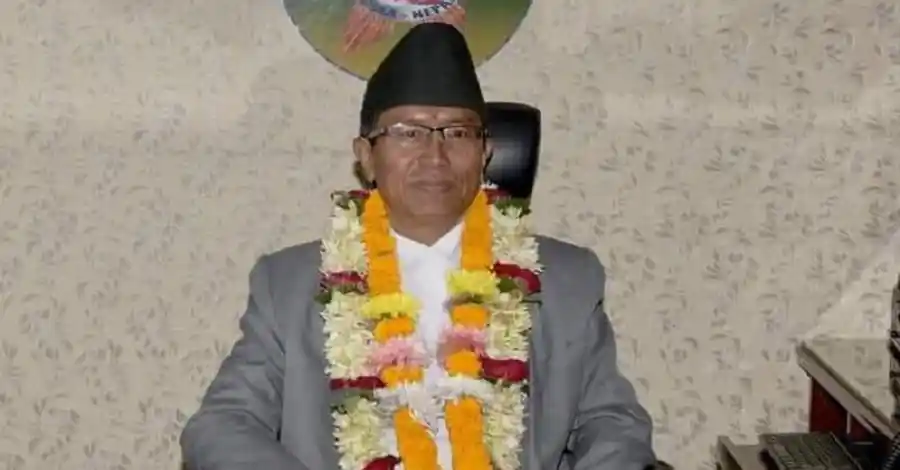Nepal’s Generation Z protesters, who recently toppled Prime Minister K.P. Sharma Oli’s government in historic anti-corruption demonstrations, have intensified their campaign by demanding the immediate resignation of Commission for Investigation of Abuse of Authority (CIAA) Chief Commissioner Prem Kumar Rai and all commissioners.
The youth-led movement, which has captured international attention and resulted in significant political upheaval, delivered a formal letter on Sunday demanding Rai’s departure, citing serious concerns about his controversial appointment, alleged political bias, and involvement in corruption scandals. This escalation marks a critical new phase in Nepal’s ongoing fight against systemic corruption and governmental accountability.

Controversial Appointment Without Parliamentary Hearing
Unconstitutional Ordinance Under KP Oli Government
The Gen Z protesters’ formal letter highlights that Rai’s appointment, along with other commissioners, was made through an ordinance issued by former Prime Minister K.P. Sharma Oli’s government, bypassing mandatory parliamentary hearings. This autocratic approach to constitutional appointments has raised fundamental questions about the legitimacy and independence of Nepal’s premier anti-corruption body.
The controversial ordinance amended key provisions of the Constitutional Council Act, allowing the government to make appointments without proper legislative scrutiny. This procedural shortcut has become a major rallying point for protesters demanding transparent governance and institutional independence.
Questioning Impartiality and Independence
The letter explicitly states that such appointment processes “raise major questions about your impartiality.” For an institution tasked with investigating corruption at the highest levels of government, perceived political dependence fundamentally undermines public confidence in its ability to function as an independent watchdog.
The protesters argue that commissioners appointed through non-transparent, politically-motivated processes cannot credibly investigate corruption within the very government that appointed them, creating an inherent conflict of interest.
Wide-Body Aircraft Scandal and Special Court Criticism
Direct Judicial Censure of CIAA Chief
In an unprecedented move, Nepal’s Special Court directly named and criticized CIAA Chief Commissioner Prem Kumar Rai while delivering its verdict in the wide-body aircraft procurement corruption case. The court raised serious ethical questions about Rai’s continued presence in office, noting his central role in the scandal while serving as Secretary at the Ministry of Culture, Tourism and Civil Aviation.
The Special Court pointed to “selective prosecution” by the CIAA, suggesting that while Rai had played a central role in forming the procurement subcommittee as chair of the Nepal Airlines board, he faced no legal scrutiny in the case. Meanwhile, others who merely acted on decisions were prosecuted, highlighting apparent double standards in corruption investigations.
Wide-Body Procurement Corruption Details
The wide-body aircraft scandal involved the controversial purchase of two aircraft by Nepal Airlines Corporation, with allegations of inflated prices, kickbacks, and procedural violations. The Special Court criticized Rai for the lack of investigation by the CIAA on initial decisions regarding the purchase of older aircraft.
This scandal has become emblematic of the high-level corruption that Gen Z protesters seek to eliminate, making Rai’s involvement particularly problematic for an official now responsible for investigating such cases.

Multiple Corruption Allegations Against CIAA Chief
Formal Complaints Filed
Activist complaints have been filed demanding investigation into Rai’s alleged involvement in major scandals, including the wide-body aircraft procurement, Nepal Oil Corporation land scam, and the fake Bhutanese refugee case. These multiple allegations create a deeply problematic situation where the nation’s chief anti-corruption official faces corruption accusations himself.
The Gen Z letter references these cases, stating “your own name is entangled in the wide-body scandal and multiple corruption cases.” This creates a credibility crisis for the CIAA, as citizens question how an official under suspicion can effectively lead corruption investigations.
Allegations of Political Bias
The protesters’ letter also addresses widespread criticism that “your actions are politically biased.” In Nepal’s fractious political environment, where corruption investigations can be weaponized for partisan purposes, maintaining absolute neutrality is essential for the CIAA’s legitimacy.
Accusations of selective prosecution—going after political opponents while protecting allies—have plagued the CIAA under Rai’s leadership, further eroding public trust in the institution’s ability to combat corruption fairly and effectively.
Gen Z Movement Context and Historic Significance
75 Lives Lost in Anti-Corruption Struggle
The Gen Z-led protests resulted in seventy-four deaths, making this one of the deadliest periods of civil unrest in Nepal’s recent history. The letter explicitly honors these sacrifices, stating: “Respecting the martyrdom of 75 Nepali citizens who gave their lives to end misgovernance, corruption, and impunity, on ethical grounds we call upon and pressure you and all commissioners through this letter to resign immediately.”
This reference to martyrdom underscores the profound seriousness with which young Nepalis view the corruption crisis and their willingness to accept tremendous personal risk to demand change.
Movement That Toppled Government
Prime Minister Khadga Prasad Oli stepped down just five days after a social media ban ignited nationwide protests in September 2025. The protests continued even after the government lifted the social media ban, with protesters setting fire to Parliament and other government buildings.
Having successfully forced a prime minister’s resignation, the Gen Z movement now turns its attention to institutional reform, recognizing that leadership changes alone cannot address systemic corruption without restructuring key oversight bodies like the CIAA.

Regional Context: Youth-Led Anti-Corruption Movements
South Asian Pattern of Youth Uprisings
The uprising in Nepal echoed recent youth-led movements in Sri Lanka (2022) and Bangladesh (2024), where national governments were toppled amid frustration over economic mismanagement and corruption. This regional pattern demonstrates how younger generations across South Asia are increasingly willing to mobilize against entrenched corruption and governmental dysfunction.
These movements share common characteristics: heavy use of social media for organization, demands for systemic rather than merely leadership changes, and willingness to sustain protests despite violent government crackdowns.
Systemic Corruption Rankings
Nepal ranks 107th among the 180 countries covered by Transparency International’s Global Corruption Barometer, highlighting the severity of the corruption problem facing the nation. This middling ranking reflects widespread corruption across political and public institutions, creating the fertile ground for youth frustration that erupted in the Gen Z protests.
Demands for Institutional Independence
Call for Impartial Appointments
The Gen Z letter emphasizes that “to fulfill these demands [ending corruption and impunity], it is necessary to appoint impartial, independent, and capable officials to the Commission for Investigation of Abuse of Authority.”
This demand recognizes that anti-corruption institutions can only function effectively when insulated from political interference and led by individuals with unquestionable integrity. The current crisis of confidence stems directly from appointment processes that prioritized political loyalty over competence and independence.
Constitutional Process Violations
By highlighting that appointments were made “through an ordinance issued by the government of former Prime Minister Khadga Prasad Sharma Oli in an autocratic manner without parliamentary hearings,” the protesters underscore their demand for constitutional compliance and democratic accountability.
This insistence on proper procedure reflects a sophisticated understanding that sustainable reform requires not just new faces but fundamental changes to how institutions operate and how officials are selected.
Special Court’s Unprecedented Intervention
Judicial Questions About CIAA Leadership
The Special Court’s decision to directly name and criticize the sitting CIAA Chief represents an extraordinary judicial intervention. Courts typically exercise restraint in commenting on officials not directly before them, making this criticism particularly significant.
This judicial censure provides legal and moral weight to the Gen Z protesters’ demands, demonstrating that concerns about Rai’s conduct extend beyond activist circles to include the judiciary itself.
Implications for CIAA Credibility
When the nation’s Special Court publicly questions the impartiality of the chief anti-corruption official, it creates an institutional crisis. The CIAA’s effectiveness depends entirely on public confidence in its independence and fairness—qualities now seriously compromised by judicial criticism and popular protest.
Future of Nepal’s Anti-Corruption Framework
Need for Comprehensive Reform
The Gen Z movement’s focus on the CIAA reflects recognition that Nepal’s corruption problem requires institutional solutions, not merely changes in political leadership. Even with a new government, corruption will persist if oversight bodies remain compromised or ineffective.
Comprehensive reform must address appointment procedures, operational independence, resource allocation, and accountability mechanisms for the CIAA itself. Without such reforms, the cycle of corruption and impunity will continue regardless of who occupies political offices.
Youth Engagement in Governance
The sophistication of the Gen Z protesters’ demands—focusing on procedural legitimacy, institutional independence, and systemic reform—suggests a generation determined to fundamentally reshape Nepali governance. This sustained engagement may represent a turning point in the nation’s political culture.
For more information on Nepal’s political developments and governance issues, visit Singha Darbar.
Conclusion: Watershed Moment for Nepal’s Anti-Corruption Fight
The Gen Z movement’s demand for CIAA Chief Prem Kumar Rai’s resignation, alongside all commissioners, represents a critical escalation in Nepal’s anti-corruption struggle. With 75 lives lost, a government toppled, and now institutional reform demanded, young Nepalis have demonstrated unprecedented determination to end systemic corruption.
The confluence of controversial appointments, judicial criticism, corruption allegations, and massive public protest creates an untenable situation for Rai and his fellow commissioners. Whether they resign or not, the Gen Z movement has irreversibly shifted Nepal’s political landscape, making accountability and transparency non-negotiable expectations for any official entrusted with fighting corruption.
The world watches as Nepal’s youth demonstrate that meaningful change requires not just removing corrupt leaders but fundamentally restructuring the institutions meant to prevent corruption in the first place.


















Comments